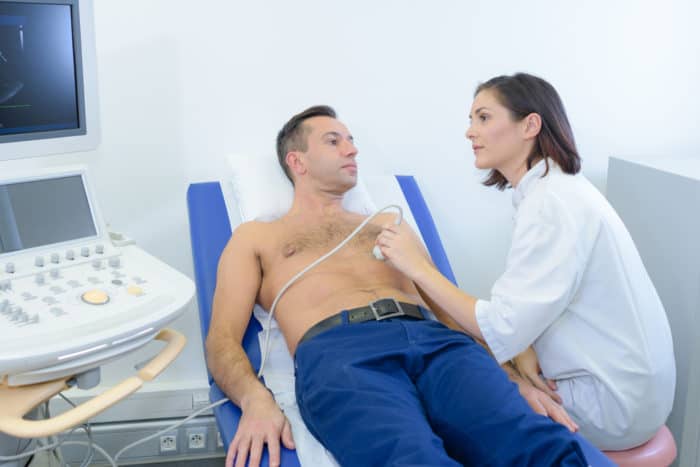Cardiovascular Technologist

As more baby boomers enter their senior years, the demand for specialists trained in cardiovascular technology continues to rise. Together with physicians, cardiovascular technologists help to diagnose and treat conditions associated with heart disease and vascular disorders. Learn more about the role of the cardiovascular technologist and the future job outlook for specialists in this field.
In This Article
What is a Cardiovascular Technologist?
Cardiovascular technologists and technicians are trained in diagnostic imaging technologies that monitor the circulatory system. Also known as cardiovascular technicians or vascular technicians, there are three primary types of cardiovascular technologists in this allied health profession.
EKG Technician
Cardiovascular technicians are cardiovascular technologists who obtain EKGs are known as electrocardiograph (or EKG) technicians. An electrocardiogram (ECG or EKG) records the electrical signal from your heart. Based on the signal patterns recorded, the cardiovascular technologist and physician can identify various potential heart conditions.
To capture your heart’s electrical signals, an EKG technician places electrodes on your chest, arms, and legs. The cardiovascular technologist then adjusts various settings on the machine in order to obtain a reading. The signals are shown as waves on an attached computer monitor or printer.
Once a sufficient number of signals have been captured, a report is printed from the EKG machine for the attending doctor to interpret. Typically this test is performed as part of a routine physical exam, a patient admitted who is complaining of heart-related symptoms such as a heart attack, and before most surgeries.
With advanced training, some EKG technicians perform what is called Holter monitoring and stress testing. Similar to an EKG, technicians put electrodes on the patient’s chest. The patient then keeps the Holter monitor with them for the next 24 hours and provides enough data for the technician to compile the results, review them for quality assurance, and give them to a doctor for review.
Doctors can use this information to diagnose various heart conditions, assess problems with pacemakers, and generally determine the performance of the patient’s heart.
For patients getting a thorough checkup on their circulatory system, the cardiovascular technologist may perform what’s called a stress test. Stress tests are performed on a treadmill where the patient is taken through various paces while being monitored by an EKG.
Before beginning the test, the EKG technician will document the patient’s medical history, explain the test, connect the patient to the monitor using electrodes, and obtain a baseline reading and resting blood pressure.
The position of EKG technician does not typically require a license. Many technicians learn on the job but there are advanced programs available.
Cardiac Sonographer
Cardiac sonographers use ultrasound equipment to examine the heart. Specifically, they look at the heart’s chambers, valves, and vessels to create echocardiogram images.
The non-invasive echocardiogram procedures can be done on patients while active or resting in place. For active patients, cardiac sonographers may also administer medication in order to better assess their heart function.
This type of cardiovascular technologist also assists physicians in performing a transesophageal echocardiogram or TEE. This is a procedure that requires a tube to be placed down the patient’s esophagus to capture the necessary ultrasound images.
Vascular Technologist
Vascular technologists are also known as vascular sonographers or vascular specialists. Regardless of title, a vascular technologist uses ultrasound equipment to gather data on a patient’s
- blood pressure
- blood flow through the blood vessel
- cerebral, abdominal, and peripheral circulation
- oxygen saturation
- changes in limb volume
After recording the data, the cardiovascular technologist provides it to the physician, typically during or immediately following surgery.
What Does a Cardiovascular Technologist Do?
Also known as cardiac sonographers and echocardiologists, cardiovascular technologists work with the diagnostic cardiovascular technology equipment used in the assessment and treatment of heart conditions. Some of the cardiovascular technology equipment these specialists work with to diagnose heart concerns includes
- Computerized imaging technology
- Sound waves (sonography)
- Electrocardiograph or EKG
- Pacemakers
This cardiovascular technology equipment is used to monitor patient heart rates, track blood flow rates and take images of the heart. Cardiovascular technologists may also assist physicians during open-heart surgery with pacemaker, stent, and catheter procedures. These procedures involve opening artery blockages and/or clearing other major blood vessels.
When treating patients, cardiovascular technologists and technicians may perform and assist with invasive procedures, such as catheter insertions, cardiac catheterization, or other non-invasive procedures such as taking images of the heart or monitoring blood circulation using ultrasound equipment.
As a cardiovascular technologist, you might also:
- Prepare patients for procedures.
- Prepare, maintain, and operate diagnostic imaging equipment.
- Review test and imaging output for quality and identify any abnormalities.
- Provide summaries of findings to physicians.
- Keep track of patient records.
Where Does a Cardiovascular Technologist Work?
Cardiovascular technologists and technicians typically work in a hospital or an outpatient cardiac catheterization laboratory – aka cath lab. They take emergency calls and participate in saving the lives of anyone experiencing cardiac arrest or requiring monitoring of a serious heart condition.
How Much do Cardiovascular Technologists Make?
Compared to other occupations within the medical technology field, a cardiovascular technologist earns one of the highest salaries of all. This may be one of many good reasons to become a cardiovascular technologist.
According to salary.com, the average salary for a cardiovascular technician makes $47,261 a year as of May 27, 2021. The range typically falls between $39,821 and $62,519. Indeed.com puts the salary closer to $56,000 per year while ZipRecruiter has the average salary as high as $87,045 or $42/hour.
While someone just entering the field can expect to earn at the bottom end of the scale, someone with five to nine years of experience, and advanced certifications, can earn much more. In terms of salary range from state to state, Alaska pays the highest wage of all with Montana, Washington, New Jersey, and Oregon (among others) paying higher salaries too.
How to Become a Cardiovascular Technologist
There are many paths to become a cardiovascular technologist. Interested candidates can choose from.
- Associate Degree Programs
- Bachelor degree programs
- One-year certification programs
Two-year associate degree programs are offered at community colleges, while four-year bachelor’s degree programs can be taken at four-year colleges and universities. Some employers also offer on-the-job training to become a cardiovascular technologist, though this path can be limiting in terms of future career prospects.
At the very least, interested candidates should obtain certification in cardiovascular technology. Certifications are considered the standard within the profession, which accounts for why most employers prefer to hire certified technologists.
Certifications are available in different areas, some of which include
- Echocardiography
- Vascular technology
- Electrocardiography
- Cardiology
Overall, a cardiovascular technologist position offers a promising career path for the trained professional in cardiovascular technology.
Sponsored Programs
The College of Health Care Professions , Online
Location - Houston, TX, US 77074The College of Health Care Professions is a Texas-based career education school founded by physicians in the Texas Medical Center solely specializing in healthcare education and dedicated to provid... Read More
ProgramsLimited Medical Radiologic Technologist with MA Skills - Certificate
Job Outlook
Data collected by the American Heart Association show heart disease as the leading cause of death in the United States. Not surprisingly, the demand for cardiovascular technologists is expected to grow by 12 percent from 2019 to 2029, according to the U.S. Bureau of Labor Statistics.
As of 2010, cardiovascular technologists held an estimated 49,400 jobs within various work settings, some of which include
- Physician’s offices
- State/local/private hospitals
- Outpatient care centers
- Medical and diagnostic laboratories
With ongoing advancements in imaging technology, an increasing number of medical facilities will replace invasive procedures with non-invasive imaging procedures, which are also less costly. As a result, the demand for cardiovascular technologists will increase accordingly.
How to Find Cardiovascular Technologist Jobs
In order to find a job as a cardiovascular technologist, you’ll want to put together a resume that outlines your education, training, certification, and any previous related experience. Along with these, be sure to describe how you’ve demonstrated the following:
- Coachable – able to follow instructions to the letter
- Hand-eye coordination – the ability to manipulate equipment and anatomy in response to what the equipment is showing you
- Empathy and interpersonal skills – good bedside manner and the ability to communicate and connect with patients.
- Stamina – you are fit, able to move patients and remain standing for long periods of time.
Once your resume is ready, don’t miss a beat—start looking for your first cardiovascular technologist job.

